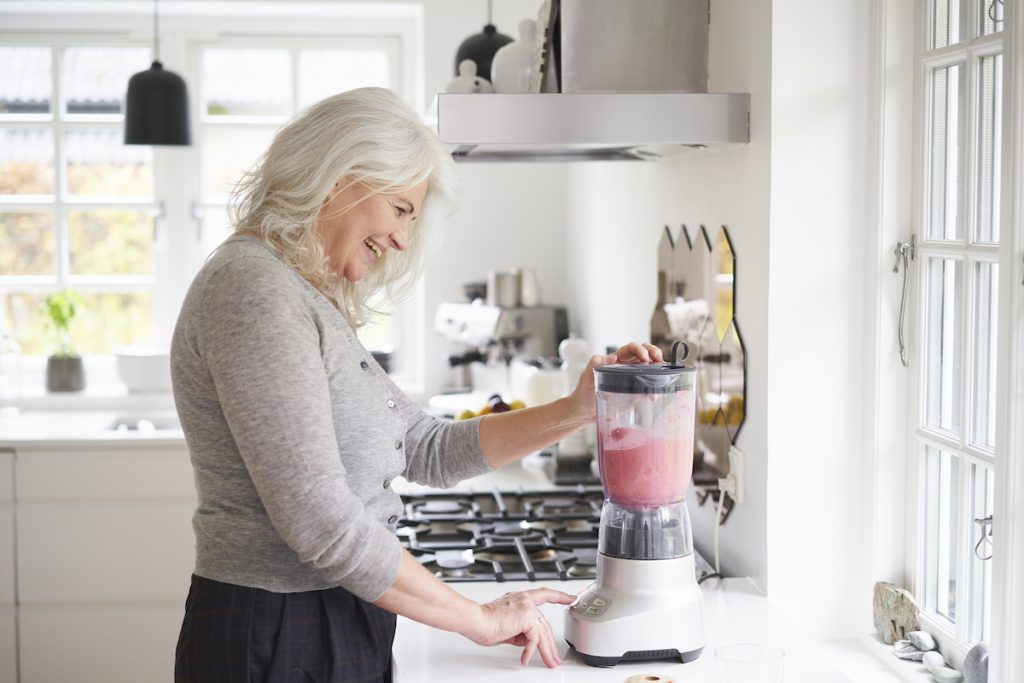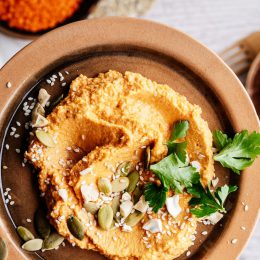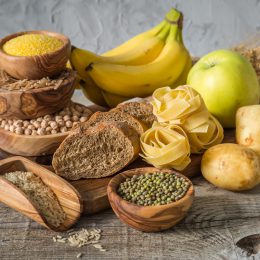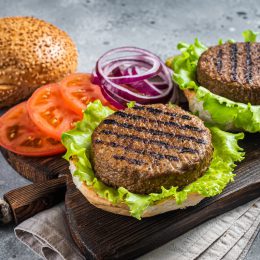10 Deliciously Simple Ways to Boost Your Fiber Intake
Yes, you probably do need to eat more fiber. And you can solve that dietary problem by simply tweaking the dishes you already enjoy.

Fiber is one of the key three macronutrients, along with protein and fat, that are essential for good health. But Americans frequently fall short of eating enough fiber, even if they think they’re consuming enough of it. Research says that only about 5% of the population gets enough fiber every day.
And as an older adult, that isn’t great for either your current health or your future longevity. A large review published in the journal Clinical Nutrition found that higher consumption of dietary fiber slashed the risk of mortality from all causes by more than 20%.
Fiber offers a path to better health in several different ways. It improves cholesterol numbers, regulates blood sugar and fosters a healthier microbiome. That’s the colony of bacteria that lives in our digestive tract that stimulates our immune system.
Fiber is also bulky, so it helps make meals and snacks more filling. This helps prevent overeating and can keep you at a healthier body weight.
Fiber-filled foods like fruits, vegetables, whole grains, beans and legumes are also nutrient dense. So it’s a very smart move for your energy levels, your bone health, and your overall wellbeing to make sure you are eating enough of those foods. Experts say men aged 51 and older should consume 28 grams of fiber daily, while women in this age group are encouraged to eat at least 22 grams.
Getting your fill of fiber is not nearly as challenging as you may think. Be sure to try these 10 simple and inexpensive ways to fiber-up the meals you already eat.
Healthy eating and exercise go together! SilverSneakers classes and events are happening right now at participating gyms, online through SilverSneakers LIVE, and at community centers near you. Activate your free online account to get started.
When you’re making oatmeal…
Add: Ground flaxseed
Oatmeal is already a good source of fiber, and adding flax is like the cherry on top — or mixed in. Each 2-tablespoon serving has nearly 4 grams of fiber.
Nearly all of the carbohydrates in flax are in the form of insoluble and soluble fiber. Insoluble fiber slows digestion, and soluble fiber gives food bulk and helps it pass more quickly through the stomach and intestines.
Flax is also a source of alpha-linolenic acid (ALA), which is a type of omega-3 fatty acid. An analysis published in The BMJ linked a high intake of ALA in adults to a 10% lower risk of all-cause mortality and an 8% lower risk of death from cardiovascular disease.
The nutrients in flax are more easily absorbed when the seeds are ground. You can buy pre-ground flax, which should be stored in the fridge or freezer to maintain freshness. You can also grind down whole flax seeds with a coffee or spice grinder.
Recommended reading: The 5 Healthiest High-Fat Foods, According to Dietitians
When you’re making stews and chili…
Add: Parsnips
While most people don’t give this root vegetable much thought, it’s a surprisingly good source of fiber. A half cup of cooked parsnips has roughly 3 grams. This is more fiber than you will get from adding carrots into your pot. Parsnips also provide useful amounts of several micronutrients including vitamin C, vitamin K and vitamin E.
Parsnips don’t taste very good when they’re raw. They are best served cooked or roasted, which brings out a yummy, nutty flavor. And they’re quick and easy to make, since they don’t even need to be peeled first.
Recommended reading: Yes, Your Daily Walk Can Help You Lose Weight! Here’s How.
When you’re preparing salads…
Add: Lupini beans
Around the same size as fava beans, these yellow legumes are a common part of the cuisine of Mediterranean nations. Nutritionally, they stand out because they have more protein and fiber than more common legumes, such as chickpeas and black beans. Three tablespoons of lupini beans have roughly 9 grams of fiber.
Because of their bitter taste (a result of naturally occurring chemicals called alkaloids), lupini beans are often sold in a jar with brine or pickled and packaged. That means you don’t even need to cook them. Simply toss a spoonful or two onto any salad for a fiber boost. They have a pleasant, meaty texture. Look for jars of lupini beans in larger grocery store chains as well as stores that specialize in Middle Eastern and Mediterranean foods.
Recommended reading: 12 Easy Ways to Make Salad Taste Amazing — Seriously
When enjoying a bowl of yogurt or ice cream…
Add: Cacao nibs
These dark little nuggets are made by pounding dried cacao beans into small pieces. Think of them as crunchy, sugar-free, bittersweet chocolate chips. You might be surprised by the amount of fiber they deliver — about 8 grams in each 3-tablespoon serving.
Cacao nibs are also a source of several essential minerals including iron, magnesium, copper and manganese. You can also use them in baked goods like muffins or toss them on top of oatmeal. Cacao nibs are available in most health food stores and larger grocery store chains.
When pouring a bowl of cereal…
Add: Raspberries
Boost your fiber intake at breakfast with a little pop of color. A 1/2 cup serving of this sweet-tart fruit contains 4 grams of fiber, which is more than most other popular types of fruit. You’ve probably noticed that raspberries contain plenty of seeds, which is why they are fiber heavyweights.
As a bonus, raspberries are a good source of anthocyanins, which are a class of antioxidants that can help reduce cell damage in the body. That may, in turn, lower systemic inflammation too. Frozen raspberries are typically less expensive than fresh ones.
When making sandwiches…
Add: Refried beans
Forget the mayo. Refried beans are the creamy sandwich spread you should be reaching for. A 1/4 cup serving has roughly 3 grams of fiber, which is double what’s found in most condiments. You also get a bonus of added protein, which helps older adults build and maintain muscle mass.
Simply spread some refried beans, which is most often just mashed up pinto beans, on whole-grain bread and then add your normal sandwich toppings. Look for cans of refried beans that do not include added fats.
Subscribe to our newsletter
It's quick and easy. You could be one of the 13 million people who are eligible.
Already a member? Click to discover our 15,000+ participating locations.
Follow Us
When you’re whipping up pancakes…
Add: Wheat bran
This is an effortless way to add more fiber to your Sunday flapjacks. Wheat bran is made up of only the outer shell of the wheat kernel, so it’s especially concentrated in dietary fiber: 3 grams in 2 tablespoons. The insoluble fiber found in wheat bran can also help keep your bowel movements regular.
To prepare them, swap out about 25% of the flour in a pancake or waffle mix with wheat bran. This will boost fiber without significantly altering the flavor and texture of your pancakes. You can also try this same idea when making baked goods like muffins. It’s also a higher-fiber replacement for breadcrumbs when preparing meatballs, meatloaf and veggie burgers.
When you’re roasting vegetables…
Add: Pears
You’re already doing great getting fiber into your diet if you’re roasting a pan of veggies, but you can boost your fiber even more by adding chopped pears. They add a pleasant, sweet element to the mix, and a medium-sized pear will give you 5 grams of fiber, which is about 25% more than that what’s in most apples.
Pears are also rich in pectin. That’s a type of soluble fiber that may improve gut health and immune function. You also get vitamin C from this fruit, which helps keep your immune system working properly. Sliced pears are also great on cereal and salads, and the fruit itself is an excellent high-fiber snack option.
When you’re blending a smoothie…
Add: Coconut flour
Why not make your smoothies higher in fiber and give it a tropical taste? Coconut flour is made from coconut meat that’s dried and then ground into flour. It’s a great source of fiber – 5 grams in a mere 2-tablespoon serving. This gluten-free flour is also a good source of potassium to help keep blood pressure numbers in the safe range.
Coconut flower has significantly less saturated fat than coconut milk and coconut oil. And it doesn’t does not need to be heated, which is why it’s a good option for blender drinks. It also stirs well into a pot of oatmeal.
When you’re cooking grains…
Add: Edamame
Like other beans, these bright green soybeans are a surefire way to bump up your fiber. Toss a 1/2 cup of edamame with brown rice, quinoa or other cooked grains, and you’ll add another 4 grams of fiber to your meal. Other nutritional highlights include folate, magnesium, iron and vitamin K.
Look for bags of shelled edamame in the frozen vegetable section of supermarkets. Edamame is also a good fiber-rich addition to salads, soups and stir-fries. You can blend it into creamy dips, too. Be sure to boil them for a few minutes until tender before eating.
See our sources:
Fiber intake inadequacy: American Journal of Lifestyle Medicine
Fiber and mortality risk: Clinical Nutrition
Daily fiber recommendations: USDA Dietary Guidelines
Microbiome: Harvard T.H. Chan School of Public Health
Amounts of fiber in foods: U.S. Department of Agriculture FoodData Central
Soluble v. insoluble fiber: Mount Sinai
Flax and ALA: BMJ
Raspberries and anthocyanins: Trends in Food Science & Technology
Pectin: Nutrients
Activate Your FREE SilverSneakers Online Account
Get hundreds of free SilverSneakers On-Demand videos and stay in touch with us by creating your free online account. You don’t have to be a SilverSneakers member to get on-demand workout videos, health and fitness tips from SilverSneakers, and more.
SilverSneakers members can go to thousands of nationwide gyms and fitness locations, plus take SilverSneakers LIVE online classes led by specially trained instructors and designed for all fitness levels and abilities – at no additional cost. If you have a Medicare Advantage plan, it may include SilverSneakers. Check your eligibility here.
Already a member? Get your SilverSneakers member ID, search for locations near you, and all the health and wellness resources you need by logging in to your online member account here.




